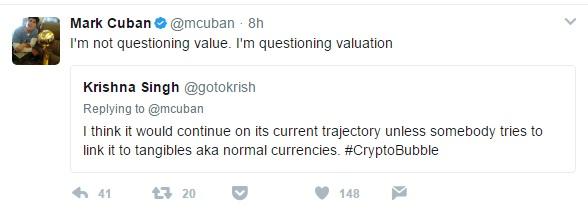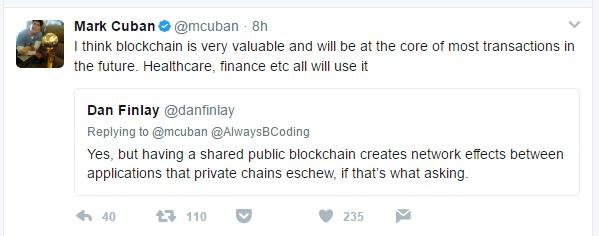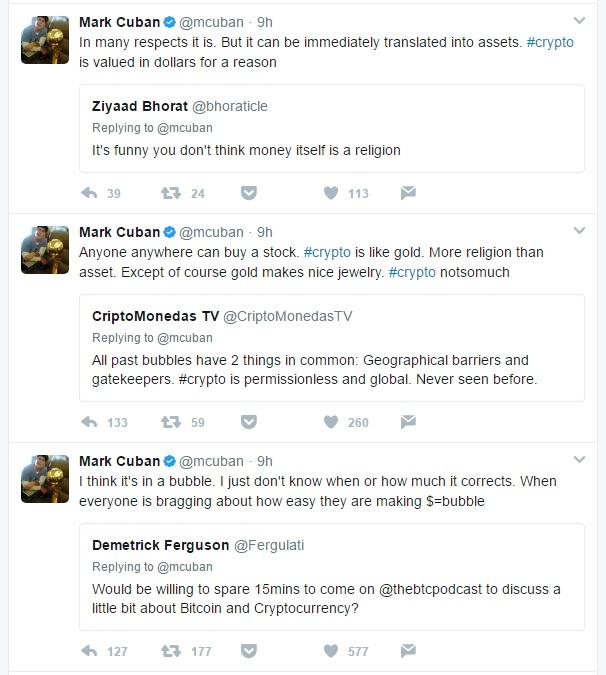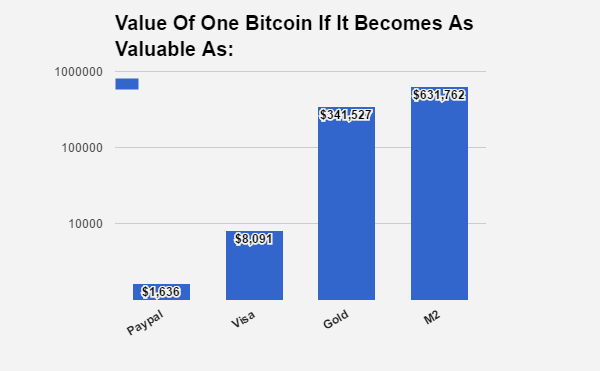Why Mark Cuban Is Wrong On Bitcoin

Mark Cuban doubts the current valuation of Bitcoin. I will discuss a few of the arguments he raised in an attention grabbing series of tweets. He makes some good points, some more questionable points and there's some stuff I disagree with. I have some cryptocurrency exposure, but below is my attempt at a measured and objective response.

Valuation, or relative value, is of course the first thing any businessperson considers. It's completely fine to question valuation. In my mind it is questionable to hold just $20 worth of Bitcoin when you also own the Dallas Mavericks. That seems overconfident about its overvaluation.
Valuation of a currency or asset that shares some currency functionality is by definition problematic. Take the Euro for example. When I open my wallet and pull out a couple of bills I can exchange them for stuff. If I pull out the exact same number of grams of paper making up Bolivar, I'm not getting very far.
The Euro has value besides the commodity value of the paper it is printed on. We accept it, convinced that it will be exchangeable for other objectively useful stuff; like a latte, burritos or Golden State tickets, somewhere down the line. But there is no fail-safe or reason why this should be the case in practice. That's why there continues to be deep interest by people to hold gold, land and real businesses.
Sometimes you hear the argument Bitcoin are just bits on a computer that don't really exist, in my opinion that's not necessarily a big problem at all. But in any case it is exactly what the euro is, or the U.S. dollar for that matter.
There are not that many big differences between fiat currencies like the Euro and the dollar and cryptocurrencies. The fiat currency have been declared legal tender by governments, which means we have to accept it, but in most cases the government does not tell us how much of it we have to exchange certain goods for.
The intrinsic value of the currencies is in constant flux, its what currency traders attempt to take advantage of, and established in the complex adaptive system of the real world economy. The government did establish an entity to have some influence on its perceived value, but that control is easily overstated. Crypto believers will argue cryptocurrencies are a strictly improved version of fiat currency because of the removal, of the centralized influence of central banks.

This is a super interesting tweet because it suggest Cuban is one of many who bought into a common misunderstanding about blockchain. There is a lot of buzz surrounding blockchain and private blockchain applications. That's, at least in part, undeserved.
The blockchain and the value of Bitcoin are inextricably linked. Blockchain allows to set up systematically vetting of transactions through a decentralized system with voting parties incentivized in an independent manner. The blockchain is very safe, even without any additional expensive systems of checks and balances like a court system, because it is open, decentralized and control is dispersed.
The effort required to tamper with the transactions you are passing through it is equal to the effort required to blow up the whole system. Basically, to hack one transaction, you have to hack them all. Given Bitcoin has a market cap of nearly $50 billion you can bet on it being fairly resilient to tampering. Hacking a private blockchain vs. the Bitcoin blockchain is what stealing from your mom's wallet is to robbing Fort Knox.
Private blockchain sounds more secure but in reality it means going back to a database system where the failsafe system of local law provides the security. Private blockchain is a very minor innovation and compared to the public blockchain its ledger is much less safe. It doesn't come with the completely decentralized system that doesn't care about your transaction at all, but is solely incentivized to uphold blockchain integrity. If you believe blockchains technology will be big, a consequence is that a cryptocurrency will be big.
It is possible that cryptocurrency won't be Bitcoin. But the idea you can create an endless amount of cryptocurrencies to power all kinds of transactions is a fallacy. It is likely there will be many each with their niche but they need to be tied to valuable currencies. That's because the value of the total amount of cryptocurrency in circulation and the way transaction verification processes are structured means the security of a blockchain is related to the value of a cryptocurrency or asset or whatever.
There could actually be some virtuous cycle effects where the more valuable a cryptocurrency becomes, the greater the value of its blockchain, etc.

The above are the first few tweets by Cuban. He starts off by stating it is in a bubble. I'm not going to argue its value could not go down a lot from here. I just don't know. I think it's a buy because of its expected positive skewness attributes while there's a clear path to wide acceptance of crypto as a new asset class.
Whether gold makes for nice jewelry is a subjective matter and the comparison to religion is distracting, but not entirely off the mark, as it isn't for the dollar or the euro either. It works because we believe. That also explains why true believers with considerable skin in the game of whatever get mad when someone challenges their set of beliefs. If the conviction is gone, the value is gone.
Finally, cryptocurrencies aren't valued in dollars. You can exchange them for dollars that's about it. If people generally talk about the Bitcoin's value in dollars it is only because of the dollars status as the reserve currency. It's also how we communicate about oil or gold. There is nothing to say there isn't one day where we talk about a barrel of oil or by that time perhaps the value of a megawatt in Bitcoin. The graph below shows the value of Bitcoin it were to equal the value of certain payment systems, gold or the M2 money supply.

Source: Created by author.
If I were Mark Cuban, I'd use my invite to make an account at U.S.-based Coinbase where over 7 million people have an account. He could buy $100 worth of Bitcoin and get $10 worth of Bitcoin free. That would increase his Bitcoin exposure by 550%. In the low-probability event Bitcoin replaces the dollar as the world's reserve currency, his $130 would net him about $28,000 -- probably not the worst ROI he's ever made.
Disclosure:Long Bitcoin, Ethereum and ZCash.



